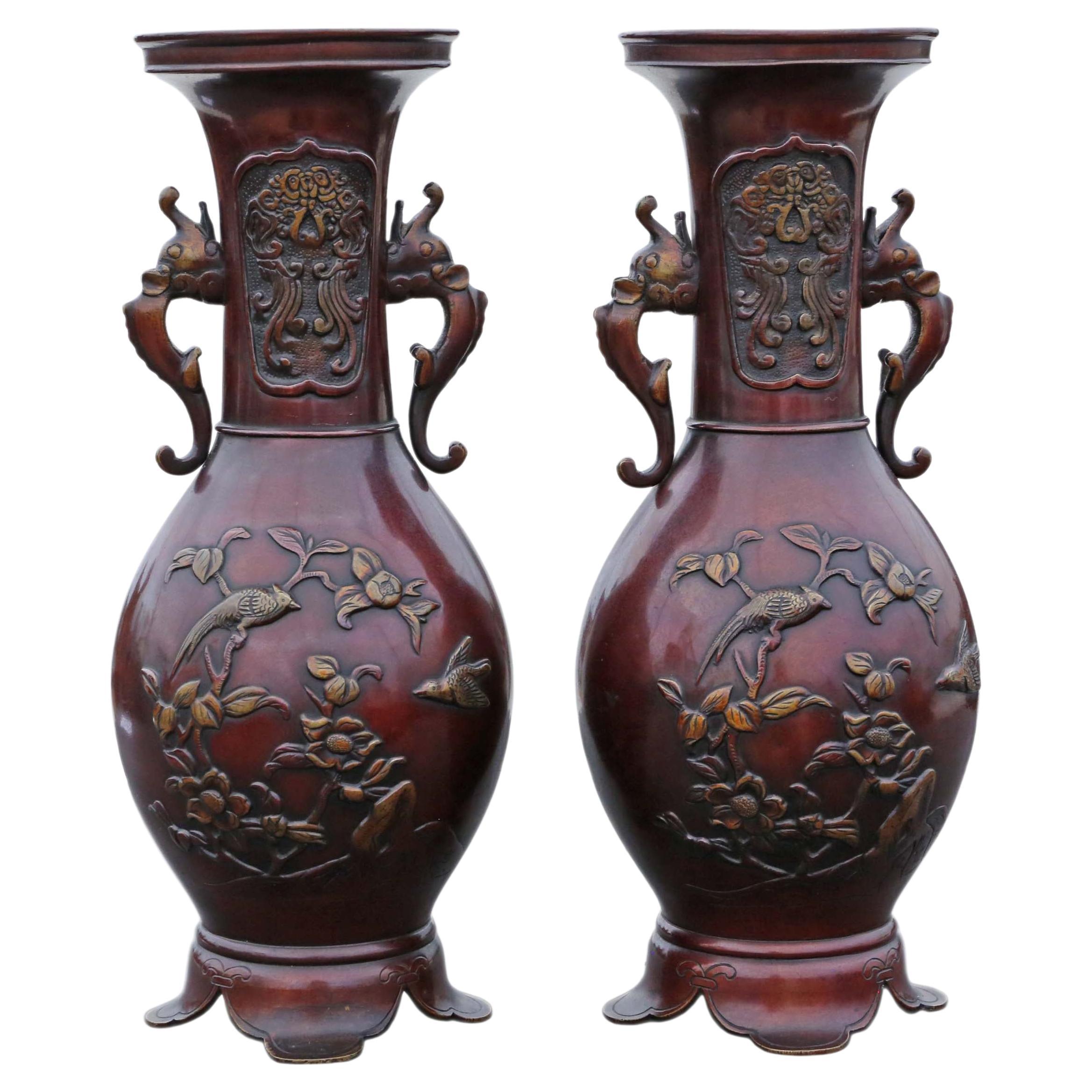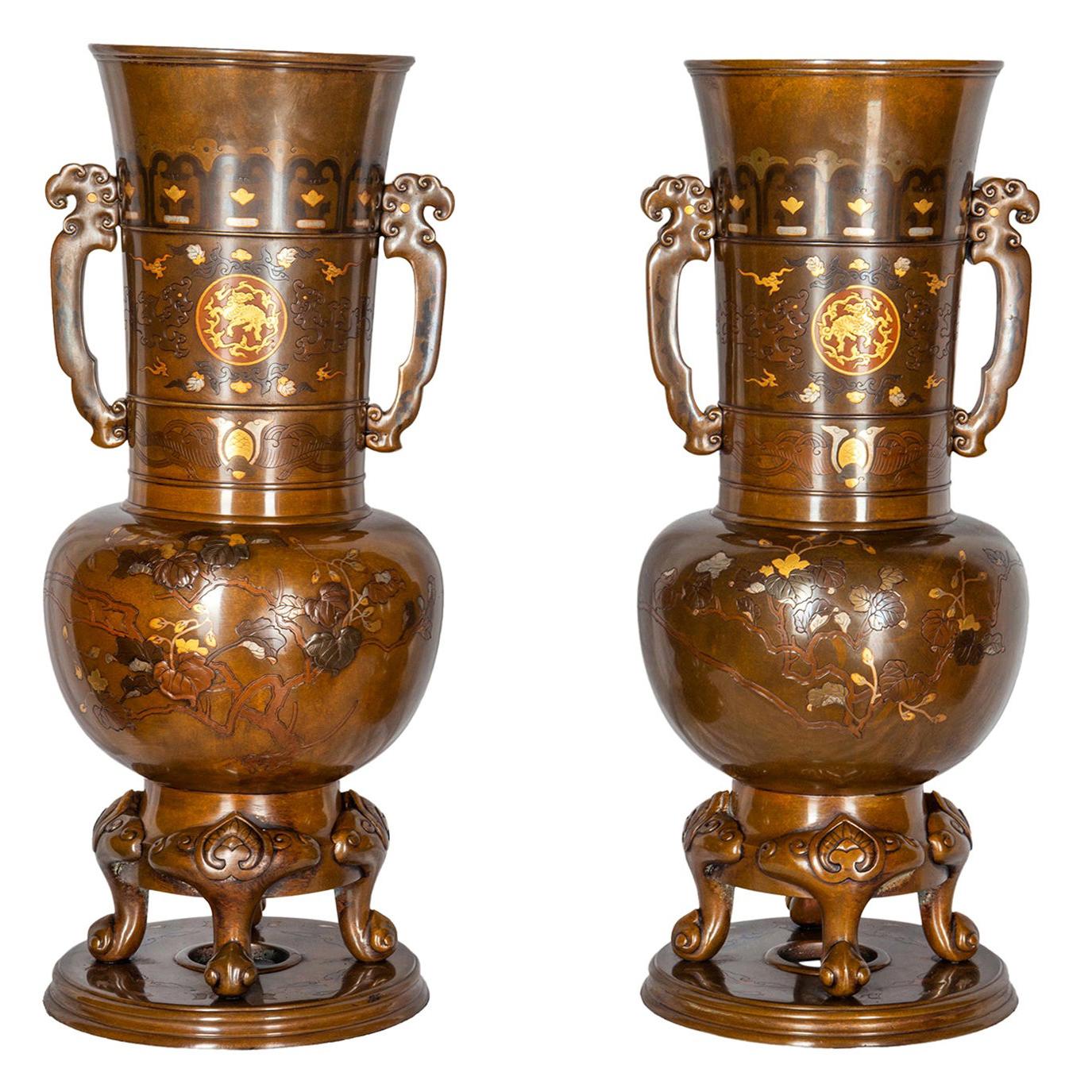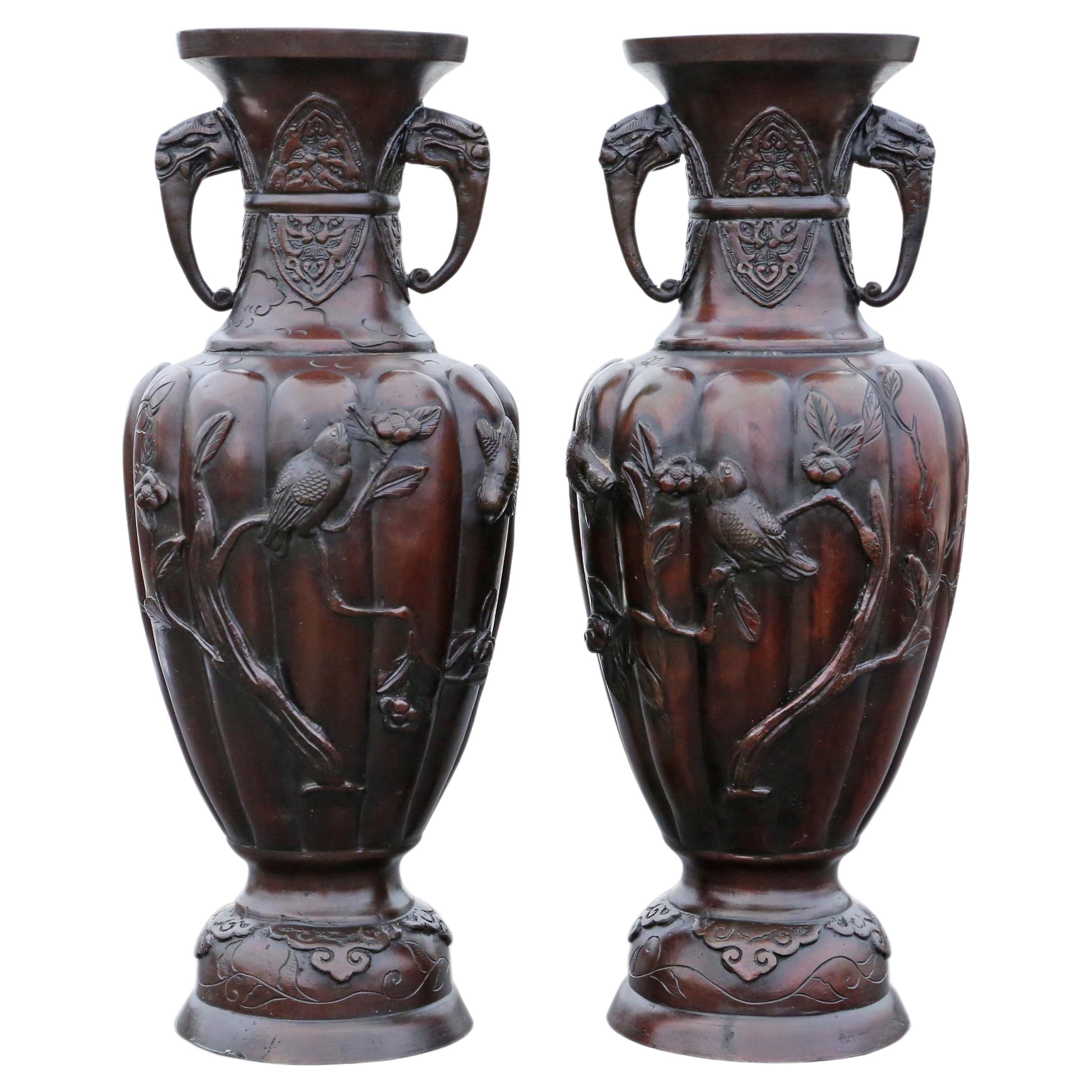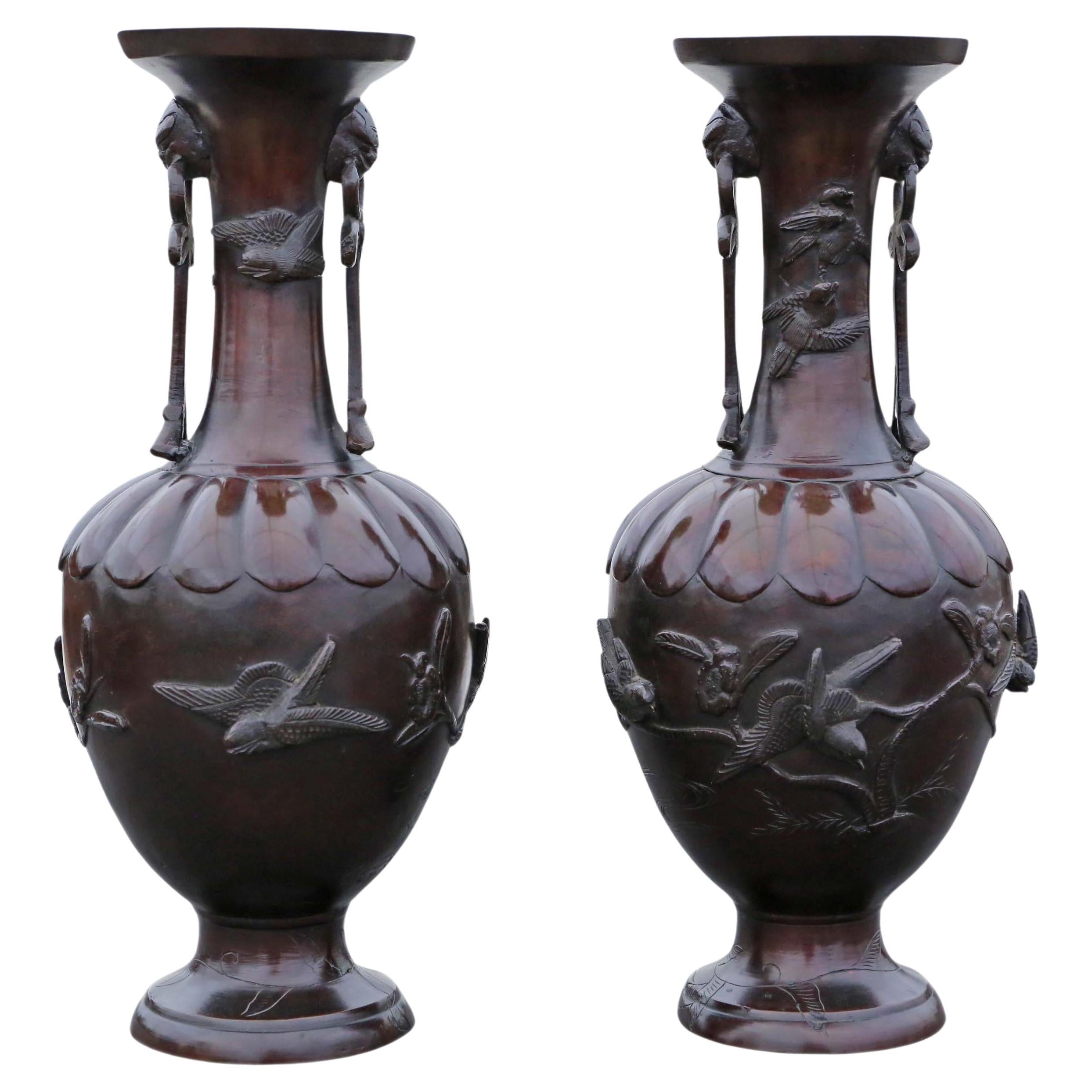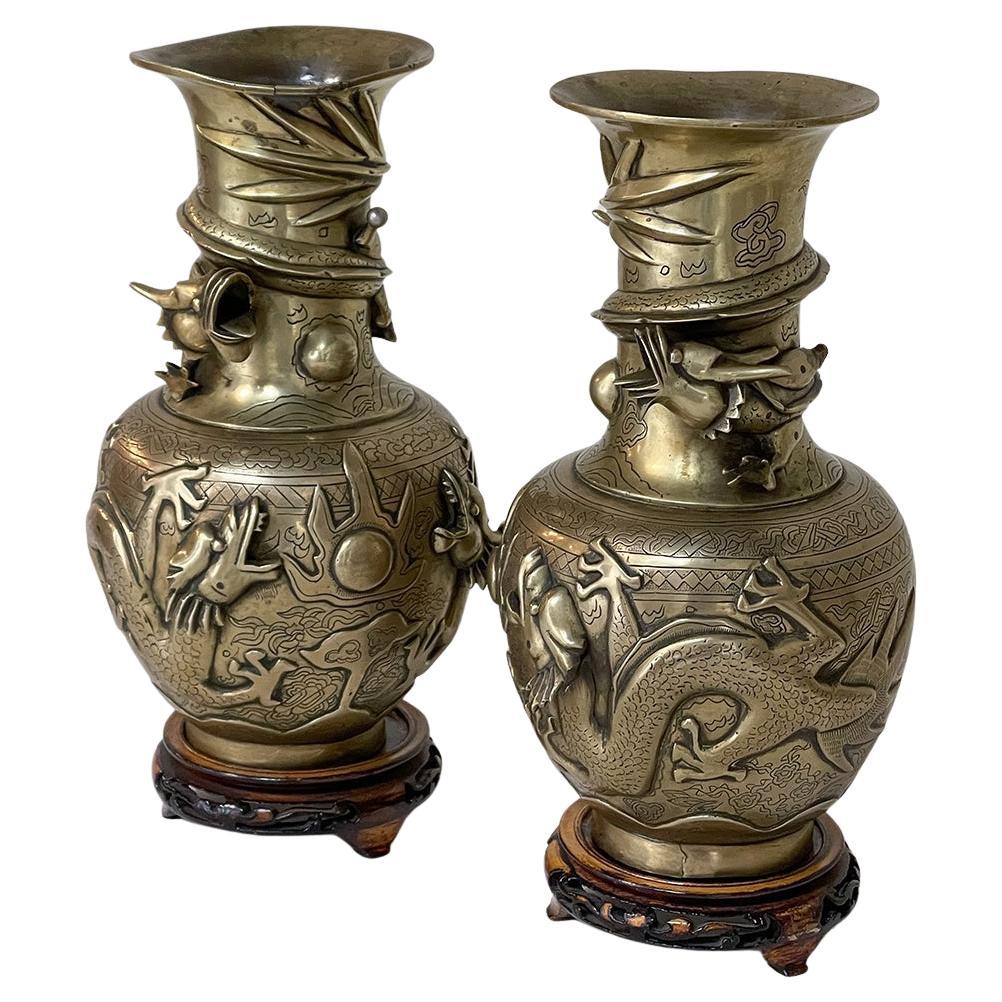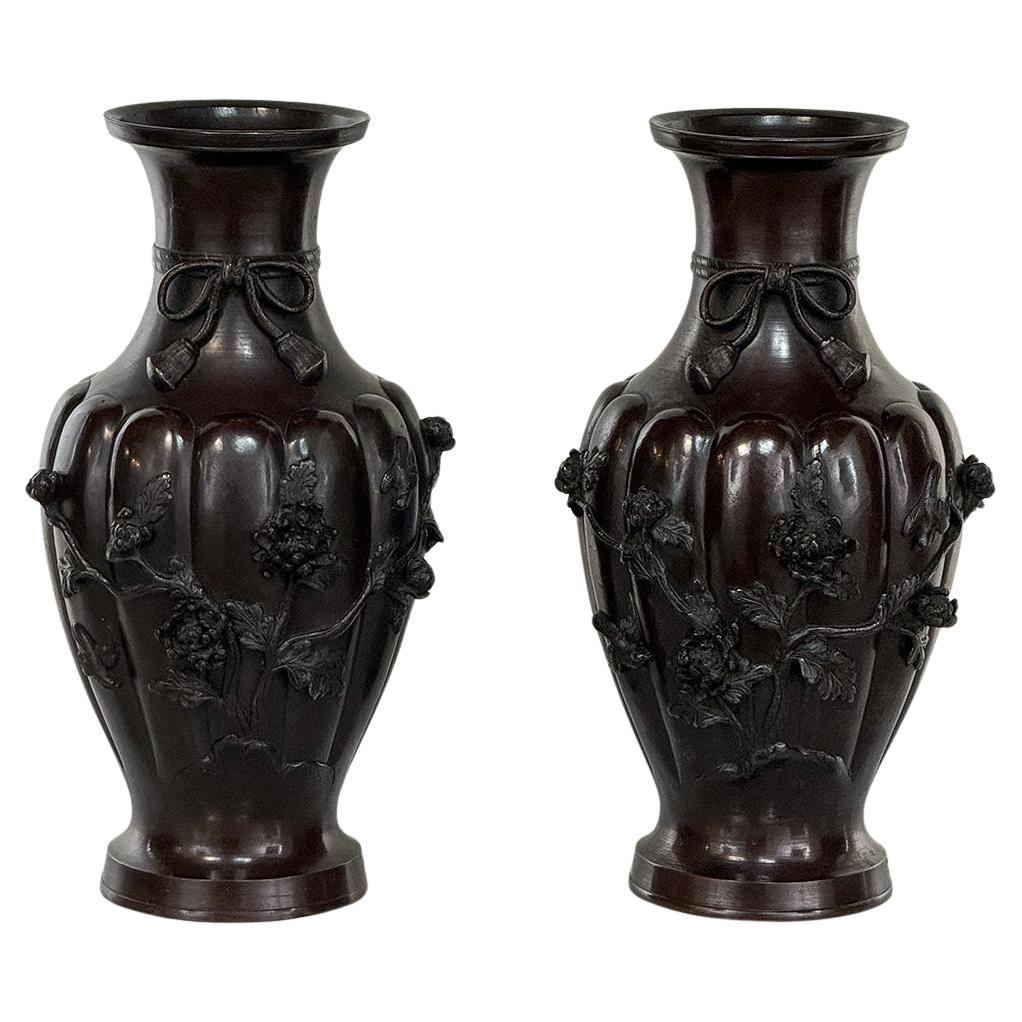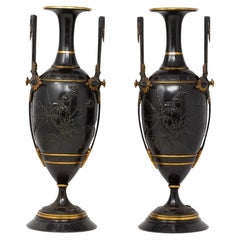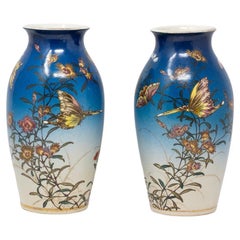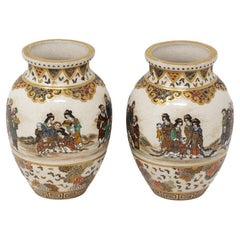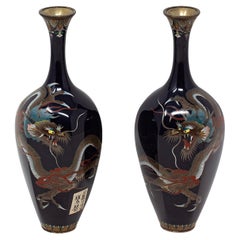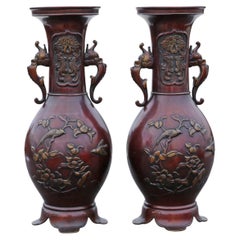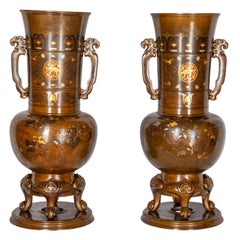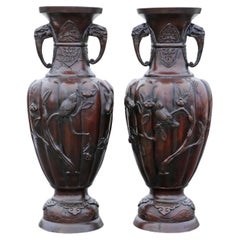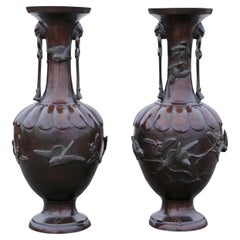Items Similar to Japanese Pair of Large Antique Meiji Period Bronze and Mixed Metal Vases
Want more images or videos?
Request additional images or videos from the seller
1 of 14
Japanese Pair of Large Antique Meiji Period Bronze and Mixed Metal Vases
$27,655.24
£20,000
€23,562.43
CA$38,317.72
A$41,580.57
CHF 22,034.04
MX$509,965.43
NOK 272,669.63
SEK 257,658.36
DKK 175,905.32
About the Item
Inlaid with Gold and Silver
From our Japanese collection, we are thrilled to offer a Japanese Pair of Meiji Period Bronze Vases. The Japanese Bronze Vases of elongated form each surmounted by waisted necks flanked by two spreading handles having accents resembling the form of Japanese Torri Gates (traditional Japanese gates) above a bulbous body upon a spreading circular base. The vases boldly decorated with gold, silver, shibuichi and shakudo using both hirazogan and takazogan techniques with berries amongst foliage and silver bellied sparrows. Across the neck, lapels of silver hearts boarder the gilt lip with further anamorphic dragon figures and draped inlay. The Japanese Bronze Vases date to the Meiji Period (1868-1912) and the second half of the 19th century circa 1890.
Shibuichi 四分一 Japanese copper alloy
Zogan 象嵌 Japanese word for Metal Inlay
Takaniku zogan or taka zogan 高象嵌 Mound Inlay technique, inlay of raised or high relief solid sheet metal. The forms of this technique can also be carved, engraved and inlaid.
Hira zogan 平象嵌 the inlay of sheet metal flush with the base metal
Shakudō 赤銅 A billion of gold and copper which can be patinated or left in its original state which resembles bronze.
Meiji Period was an era of Japanese history that spanned from 1868 to 1912. It was the first half of the Empire of Japan, when the Japanese people began to build a paradigm of a modern, industrialised nation state and emergent great power, influenced by Western countries and aesthetics. As a result of radically different ideas, the changes to Japan were profound and it affected the social structure, politics, economy, military, and foreign relations across the board. The period corresponded to the reign of Emperor Meiji and was preceded by the Keio era and was succeeded by the Taisho era.
Cultural Art during the Meiji Period was of particular interest to the government and they overhauled the art export market which in turn promoted Japanese arts via various world’s fairs, beginning in Vienna at the world fair in 1873. The government heavily funded the fairs and took an active role organising how Japan’s culture was presented to the world including creating a semi-public company named Kiritsu Kosho Kaisha (First Industrial Manufacturing Company). The Kiritsu Kosho Kaisha was used to promote and commercialise exports of Japanese art and established the Hakurankai Jimukyoku (Exhibition Bureau) to maintain quality standards. For the 1876 Centennial International Exhibition in Philadelphia, the Japanese government created a Centennial Office and sent a special envoy to secure space for the 30,000 items that would be displayed. The Imperial Household also took an active interest in arts and crafts, commissioning works by select artists to be given as gifts for foreign dignitaries further emphasising the high quality and importance of Japanese art. Just before the end of the 19th century in 1890, the Teishitsu Gigeiin (Artist to the Imperial Household) system was created to recognise distinguished artists. These artists were selected for their exceptionally high quality wares and talent in their own industry. Over a period of 54 years Seventy artists were appointed, amongst these were ceramicist Makuzu Kozan and cloisonné enamel artist Namikawa Yasuyuki.
- Dimensions:Height: 21.66 in (55 cm)Width: 6.11 in (15.5 cm)Depth: 5.52 in (14 cm)
- Style:Meiji (Of the Period)
- Materials and Techniques:
- Place of Origin:
- Period:
- Date of Manufacture:1890
- Condition:Wear consistent with age and use.
- Seller Location:Newark, GB
- Reference Number:Seller: WUDDD1stDibs: LU6971245210762
About the Seller
5.0
Gold Seller
Premium sellers maintaining a 4.3+ rating and 24-hour response times
Established in 2019
1stDibs seller since 2022
39 sales on 1stDibs
Typical response time: 3 hours
- ShippingRetrieving quote...Shipping from: Newark, United Kingdom
- Return Policy
Authenticity Guarantee
In the unlikely event there’s an issue with an item’s authenticity, contact us within 1 year for a full refund. DetailsMoney-Back Guarantee
If your item is not as described, is damaged in transit, or does not arrive, contact us within 7 days for a full refund. Details24-Hour Cancellation
You have a 24-hour grace period in which to reconsider your purchase, with no questions asked.Vetted Professional Sellers
Our world-class sellers must adhere to strict standards for service and quality, maintaining the integrity of our listings.Price-Match Guarantee
If you find that a seller listed the same item for a lower price elsewhere, we’ll match it.Trusted Global Delivery
Our best-in-class carrier network provides specialized shipping options worldwide, including custom delivery.More From This Seller
View AllFrench Aesthetic Movement Bronze Vases
By Ferdinand Barbedienne
Located in Newark, England
Decorated with Insects
From our Decorative collection, we are delighted to offer a pair of French Aesthetic Movement Bronze Vases. The Frenc...
Category
Antique Late 19th Century French Aesthetic Movement Vases
Materials
Slate, Bronze, Ormolu
Unusual Pair of Japanese Meiji Period (1868-1912) Satsuma Vases by Kinkozan
By Kinkozan
Located in Newark, England
Taizan Yohei IX Style
From our Japanese collection we are delighted to offer this pair of Japanese Satsuma Vases by Kinkozan. The Satsuma Vases of baluster shape made from earthenwa...
Category
Antique Early 1900s Japanese Meiji Ceramics
Materials
Ceramic, Earthenware, Pottery
Japanese Antique Meiji Period Satsuma Vase Pair Hand Painted by Gyokuzan
Located in Newark, England
Painted with Continuous Scenes
From our Japanese collection, we are delighted to offer this Japanese Satsuma Vase Pair by Gyokuzan. The Satsuma vase pair of squat bulbous form with ...
Category
Antique Late 19th Century Japanese Meiji Ceramics
Materials
Ceramic, Pottery
Hayashi School Cloisonné Vase Pair, Meiji Period with Tomobako
Located in Newark, England
Meiji Period (1868-1912)
From our Japanese collection, we are delighted to present this exceptional pair of Japanese Cloisonné Enamel Vases by the Hayashi School, dating to the Mei...
Category
Antique Early 1900s Japanese Meiji Vases
Materials
Silver, Enamel
Japanese Cloisonné Enamel Vase Pair by Ota Hyozo, Meiji Period
Located in Newark, England
FREE WORLDWIDE SHIPPING ON ALL OUR COLLECTION - MORE IMAGES AVAILABLE UPON REQUEST
MEIJI PERIOD (1868-1912)
From our Japanese collection we are delighted to present this exceptio...
Category
Antique Late 19th Century Japanese Meiji Metalwork
Materials
Enamel
Japanese Bronze and Mixed Metals Koro by Kumagai, Meiji Period
Located in Newark, England
From our Japanese collection, we are pleased to present this Japanese Bronze and Mixed Metals Koro by Kumagai, dating to the Meiji Period (1868–1912).
The koro is of distinctive sca...
Category
Antique Late 19th Century Japanese Meiji Metalwork
Materials
Gold, Silver, Bronze
You May Also Like
Antique Very Large Pair of Japanese Bronze Vases Meiji Period
Located in Wisbech, Cambridgeshire
Antique very large pair of fine quality Japanese bronze vases C1910 Meiji Period.
Would look amazing in the right location. Rare large size and design.
Overall maximum dimensi...
Category
Vintage 1910s Japanese Meiji Metalwork
Materials
Bronze
$1,737 Sale Price / set
30% Off
Pair of Japanese Meiji Period Bronze and Gilt Vases
By Zo Miyao 1
Located in Brighton, Sussex
Pair of fine quality Japanese Meiji period (1868-1912) patinated bronze Miyao style gold and silver overlay two handled vases, each with twin handles, classical motif decoration with...
Category
Antique Late 19th Century Japanese Japonisme Vases
Materials
Bronze
$11,062 / set
Antique Very Large Pair of Japanese Bronze Vases Meiji Period
Located in Wisbech, Cambridgeshire
Antique very large pair of fine quality Japanese bronze vases C1900 Meiji Period.
Would look amazing in the right location. Rare large size and design.
Overall maximum dimensi...
Category
Antique Early 1900s Japanese Metalwork
Materials
Bronze
$1,737 Sale Price / set
30% Off
Large Pair of Fine Quality Japanese Bronze Vases Dated 1903 Meiji Period Antique
Located in Wisbech, Cambridgeshire
Antique Very Large Pair of Japanese Bronze Vases - Exquisite Meiji Period Presentation Pieces!
These magnificent Japanese bronze vases, dating back to the Meiji Period and dated 190...
Category
Antique Early 1900s Japanese Meiji Metalwork
Materials
Bronze
$1,931 Sale Price / set
30% Off
Pair Antique Japanese Bronze Vases on Wood Stands
Located in Dallas, TX
Pair Antique Japanese bronze vases on wood stands are ideal for adding beautiful symmetry with the magic of the Orient! Encircled with thr...
Category
Early 20th Century Japanese Meiji Vases
Materials
Bronze
Pair Antique Japanese Bronze Vases
Located in Dallas, TX
Pair Antique Japanese Bronze Vases clearly illustrate the mastery of the metalsmiths of Japan! Cast and sculpted in bronze and given a rich oil-rubbed antique finish, each features ...
Category
Early 20th Century Japanese Meiji Vases
Materials
Bronze
$1,980 / set
More Ways To Browse
Japanese Metal
International Exhibition Of Modern Decorative And Industrial Arts
Weller Glazed Vases
Wiener Werkstatte Vase
Wilhelm Kage Vaga
Wirkkala Bolle
Alberto Dona Murano Art Glass Vase
Amethyst Crystal Cut Vase
Antique Hand Painted Nippon
Antique Metal Flower Vase
Antique Nippon Porcelain
Antique Pottery Stamps
Art Deco Drip Glaze
Atomic Vase
Bacchantes Vase
Barovier Efeso
Benedict Studios
Black Gold Pottery
